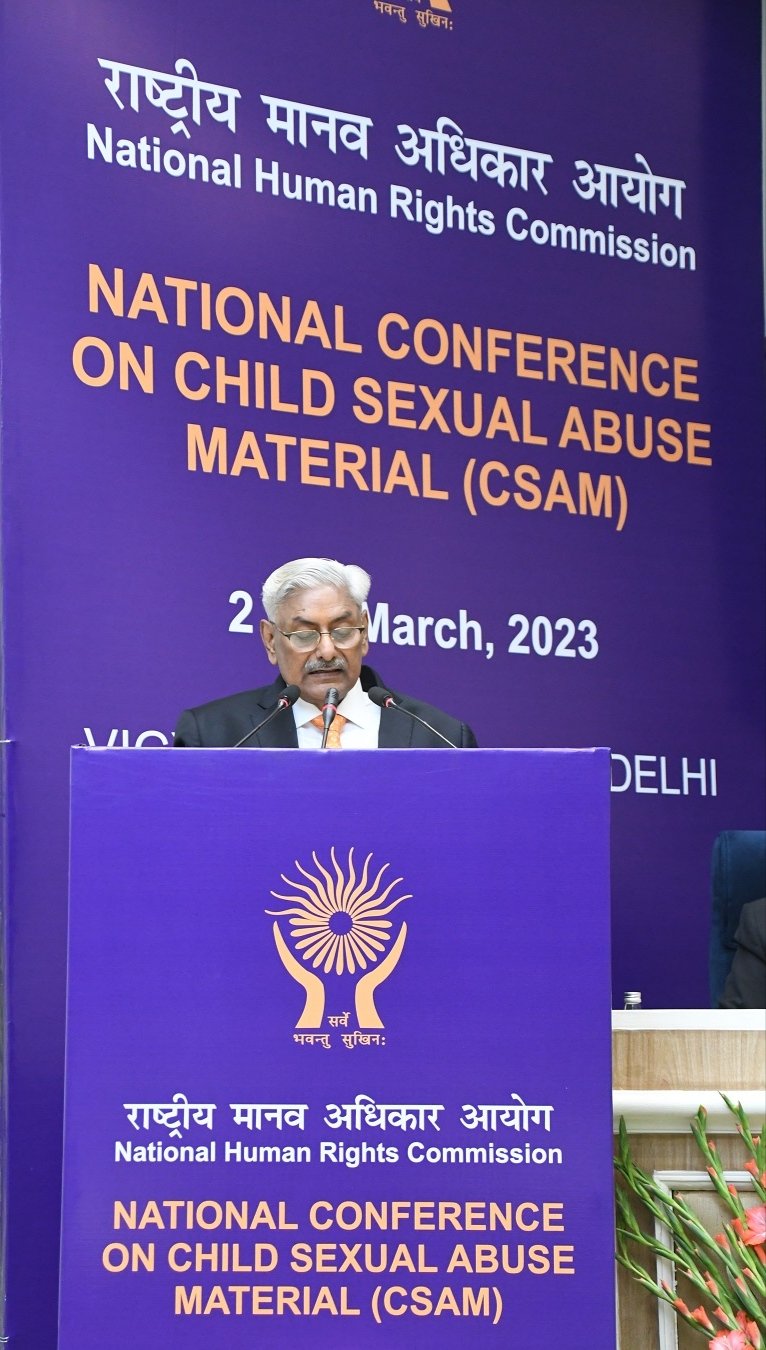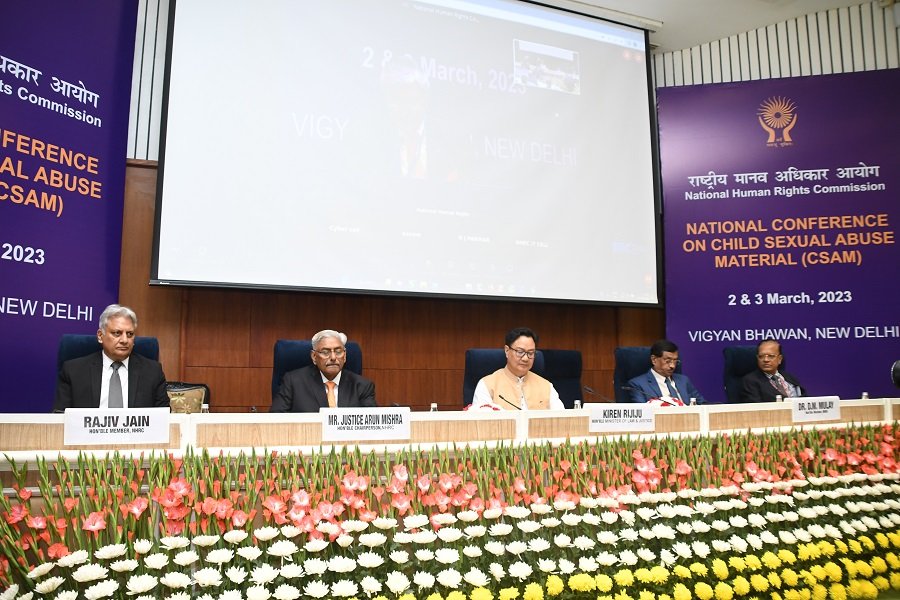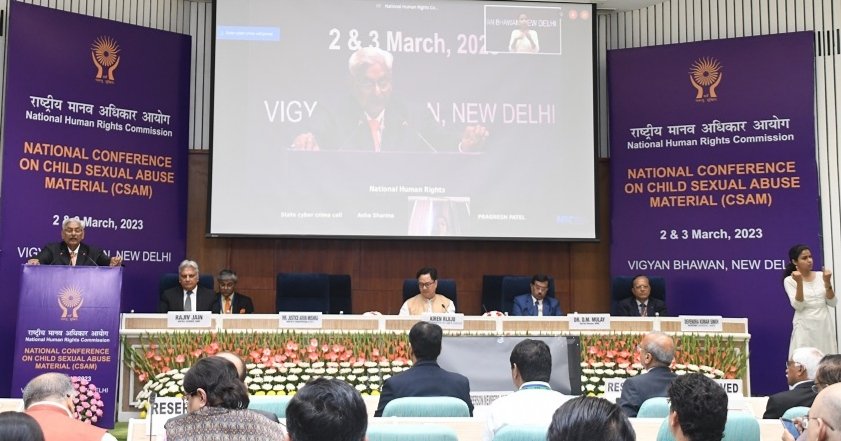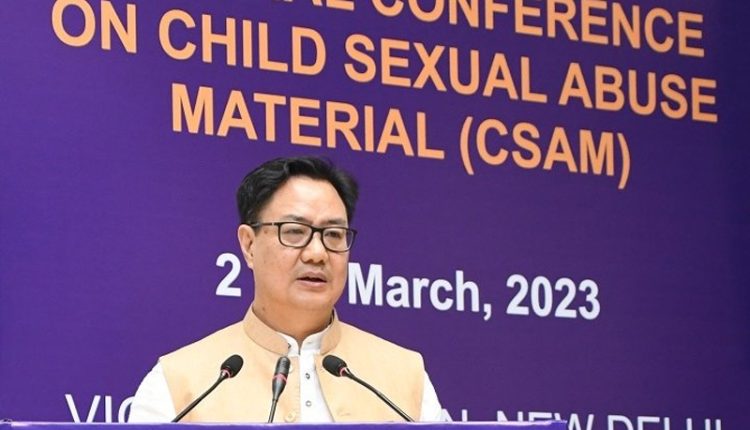The Fast Track Special Courts need to do more to dispose timely the number of cases related to Child Sexual Abuse Material: Mr. Kiren Rijiju
Digital forensic development necessary to catch and check perpetrators of Child Sexual Abuse Material, says NHRC Chairperson, Mr. Justice Arun Mishra
New Delhi : The Union Minister of Law and Justice, Mr. Kiren Rijiju today said that there are many legal provisions in the country to check the menace of Child Sexual Abuse Material, CSAM but more requires to be done beyond the legal provisions to ensure that human rights of children in particular are not violated. He said that if our women and children are not safe, what is the point of development. He said that government has to be responsive to the call and need of the time to do everything that requires to be done in this regard.
Mr. Rijiju was inaugurating, as the chief guest, the two days National Conference on Child Sexual Abuse Material organized by the National Human Rights Commission, NHRC, India in New Delhi.
He said that production, distribution and consumption of CSAM is one of the most serious forms of sexual abuse faced by children and consecutively a grave violation of their human rights psychologically disrupting their development.
He said there are a number of Fast Track Special Courts to deal with the cases of sexual violence against children. These courts have disposed of more than 1,37,000 cases. However, he said that the disposal of such cases and the conviction rate needs to be improved. The High Courts need to look into it. The State Governments need to strengthen the investigation Agencies and Forensic Labs to ensure quick disposal of CSAM cases. He said that the Centre is committed to taking more proactive action as far as the legislations are required but Judiciary and Executive along with the Civil Society need to work in tandem to make our society safe and progressive.

Earlier, Mr. Justice Arun Mishra, NHRC Chairperson said that prevention, detection, investigation and prosecution of crimes relating to online CSAM are primary responsibility of the respective States and UTS. Coordinated effort at both global and national levels will successfully make the digital world safe and secure for our children. The Internet Service Providers and Intermediaries have also to share responsibility.
He said that although internet brought revolutionary changes but cyberspace is now being misused to infringe on several human rights, including individual privacy. Therefore, cyber security is the key to fight cybercrime and preserve human rights. Digital forensic development is necessary to catch and check perpetrators of CSAM. He said that besides augmenting forensic infrastructure keep pace with emerging challenges for Enforcement Agencies.

There is also a need for the education and training of investigating officers, lawyers and judges. Mass awareness is also required for the internet users.
The NHRC Member, Mr. Rajiv Jain said that India has framed requisite laws for implementation of various international covenants for the protection of rights of children. He said that we can’t sit idle and say that we are doing our best; there is a lot more to be done to prevent, detect and prosecute the perpetrators of CSAM. The Internet Service Providers should be diligent in their duties. The intermediaries like content hosts and those enabling peer-to-peer encrypted communication, need to examine what more can be done.
NHRC Member, Dr. Dnyaneshwar M. Mulay delivered the vote of thanks. He said that the Commission would engage with various stakeholders in this regard and looks forward to having some constructive suggestions to ensure human rights of children are protected against the menace of CSAM.
Earlier, welcoming the participants, the NHRC Secretary General, Mr. D.K. Singh said that the Commission is committed to provide a platform to find out the gaps in the legal provisions and the implementation thereof on the ground. The number of cases registered in CSAM may not actually reflect the gravity of the problem.

The National Conference on CSAM is divided into five thematic sessions in addition to the inaugural and valedictory sessions. Mr. Rajeev Chandrashekar, Minister of State, Ministry of Electronics and Information Technology will address the valedictory session tomorrow. themes of the five technical sessions include ‘Understanding the Nature, Extent and Emerging Issues’, ‘Legal provisions relating to CSAM’, ‘Role of Technology and Intermediaries in Prevention’, ‘Detection and Investigation of CSAM, International Trends in fighting CSAM’ and ‘Role of Enforcement Agencies and Cyber Forensics in Detection, Investigation and Monitoring of CSAM’. The four technical sessions were chaired by the NHRC Chairperson, Mr. Justice Arun Mishra, NHRC Members, Dr. Dnyaneshwar M. Mulay, Mr. Rajiv Jain and UN Resident Coordinator, UN India, Mr. Shombi Sharp. The panelists included national and international subject experts, members of civil societies, advocates, and representatives from various key ministries.
****

